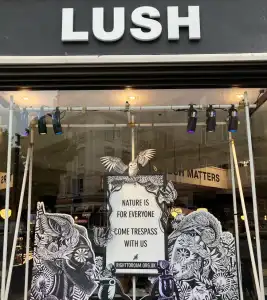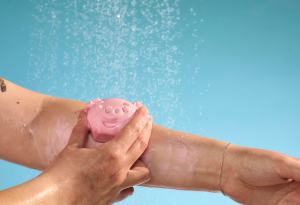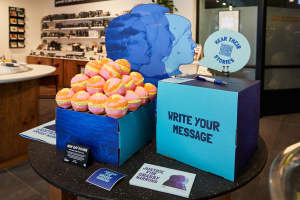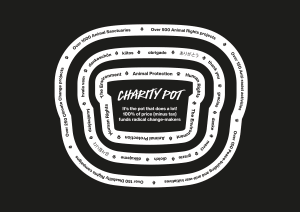Our campaigning
Since the beginning, Lush has collaborated with various organisations to run a number of campaigns in-store and online, focusing our efforts on helping people, animals and the planet by fighting for human rights, animal protection and environmental justice. We are fortunate to have retail shops in some of the most visible and high traffic areas in the world. As such, we like to use our shop windows to grab people’s attention, enticing them to enter and ask questions to find out more about an issue.
Since we run campaigns on subjects that most brands would find too controversial to take on, we can be criticised by the media and the public, but we always stand by our positions and will continue to do so. Our campaigns challenge some of the biggest issues of our time and are often accompanied by a limited-edition product to raise funds — almost 50 of these products have been launched so far.
Timeline of Lush campaigns
We have been campaigning online and in our shop windows since 2006 and have covered a plethora of issues facing human, animal and environmental rights in partnership with grassroots organisations.
Over the decades, we have used a diversity of campaigning strategies to get our point across — including supporting petition signing, facilitating communication to government officials, public activist stunts and producing documentaries.
In FY2024, we ran a total of 12 campaigns globally. Two were global campaigns, four in the UK & Ireland, four in Europe and two in North America. They covered a range of causes from refugee rights, animal rights, digital ethics, gun violence and non animal testing in cures for childhood illnesses, among others. Our campaign products in FY2024 raised £230,000 for their respective causes.
Here are examples of some of the campaigns we have run throughout the Lush world in FY2024:
Timeline

September 2023: Right to Roam (United Kingdom)

November 2023: ESC Big Tech (Global)

April 2024: Animal Circus (Italy)

May 2024: Pig Your Future (Germany)

May 2024: Justice for Grassy Narrows & Justice for Greenwood (North America)
Charity Pot Hand and Body Lotion
In 2007, Lush released a charitable giving hand and body lotion called Charity Pot for the purpose of raising money for grassroots groups, campaigns and non-for-profit organisations who were doing on the ground work towards bettering human rights, animal protection and environmental justice. At the time, these were groups that were often overlooked for funding so we sold Charity Pot in stores and online and donated 100% of sales, minus VAT, to grassroots activists causing mischief.

In 2024, we achieved a remarkable milestone by surpassing over £100 million in charitable donations since launching our giving initiatives in 2007. Through over 19,000 grants to organisations in more than 175 countries, Charity Pot body lotion played a pivotal role, contributing approximately 75% of this money raised.
In FY2024 alone, Charity Pot raised approximately £5.7 million in sales.
Reaching £100 million in giving is a huge milestone and now is a good time for Lush to pause sales of Charity Pot to reflect on our giving as a whole and assess what funding is needed to meet the current challenges our world is facing at this critical time. Whilst Charity Pot has now left our shelves, we continue to remain committed to our campaigning and charitable giving.
If you are going to give money away you might as well give it to someone who’s going to do something stupid with it. Think how much mischief you can do with a thousand here, a thousand there, it’s great. If we get a million out of the Charity Pot, we could create absolute chaos.

awarded every year, via either The Lush Prize, or Spring Prize
The Lush Prize and Spring Prize
Our two Prizes, The Lush Prize and the Spring Prize, are another innovative way we support important work and recognise essential developments in ending animal testing and environmental and social regeneration. We partner with the Ethical Consumer Research Association for both of these prizes.
The Lush Prize and Lush Spring Prize are awarded in alternating years, celebrating each prize every other year. So when the Spring Prize is held one year, The Lush Prize follows the next. Both of these prizes are funded through the global sales of our paper bags.
The Lush Prize is a global award established in 2012 as a major initiative aiming to bring forward the day when safety testing takes place without the use of animals. The Lush Prize is the largest prize fund in the non-animal testing sector, awarding £250,000 every two years. Between 2012 and 2024, The Lush Prize has distributed nearly £3 million to 140 winners across 36 countries, supporting scientists and activists in countries as diverse as China, Kenya, Iran, Ukraine, India, New Zealand, Brazil, the USA, and across Europe. You can read more about The Lush Prize in the Animal Testing principle.
For the 2024 Prize, we had 14 winning projects, organisations and scientists that spanned across 9 different countries. Among the prize recipients was Emulate, an organ-on-a-chip company that, in December 2022, demonstrated how liver-on-a-chip technology is better at predicting safe chemicals than animal tests. You can find a list of winners on our Lush Prize website.
The Lush Spring Prize is also a global award established in 2017, again in partnership with Ethical Consumer Research Association. We wanted to create something to promote actions moving beyond “sustainable” and principles of “do no harm”. We wanted a call to action to regenerate the Earth and create thriving communities. This prize aims to support and celebrate organisations and communities worldwide that are actively engaged in environmental and social regeneration, making the world Lusher than they found it.
The prize fund exceeds £200,000 and is distributed across four categories: Intentional, Young, Established and Influence. Additionally, collaborative awards such as the Indigenous Knowledge & Wisdom Award and the Permaculture Magazine Award recognise projects that integrate traditional knowledge and permaculture principles into regenerative practices.
The Lush Spring Prize not only provides financial support but also fosters a community of practice through events and learning opportunities, amplifying the impact of regenerative initiatives worldwide.
Giving Products
In 2024, when the sun had set on sales of Charity Pot, we started a new stream of limited-edition Giving Products, which were introduced as a range of products to support specific issues. The flexibility of these products allows us to target current global emergencies and direct money to areas of the world that are in need of urgent help and funding. These will be causes that our customers can really get behind and see the difference they are making. Our staff can also get involved not only through the sales of these products, but by nominating causes we may want to support.
The first product in this new stream was our Watermelon Slice soap, which didn’t start its life as a giving product, but was turned into one when our staff pointed out the importance of the watermelon symbol in the movement to support a free Palestine. We were also looking for ways to support the people of Gaza and the occupied West Bank, so we started donating money made through sales of the Watermelon Slice soap to childhood mental health services in Palestine, with priority given to trauma counselling for children in Gaza.

IMET 2000 is one such group that we already have a long standing relationship with. They provide specialised training for psychiatrists, physicians, surgeons, nurses and allied professionals in primary trauma care, notably war wounds and burns, rehabilitation, and the mental health of children and adolescents.
Since this first product, we’ve supported issues such as non-animal tested cancer research, Indigenous volunteer fire brigades in the Amazon and on Turtle Island, lawyers and human rights advocates in Mexico, and in North America, ‘She Should Run’— an organisation working to increase diverse participation in democracy. There will be many more products to follow and the goal going forward is to have 2-3 giving products on sale at all times.

Alongside this, we have also started a new giving initiative called Keystone. This stream of giving takes learnings from our charitable giving to have the biggest impact on biodiversity that we can with our donations. It is heavily inspired by keystone species, which are species that have a disproportionately large impact on the system it is a part of, acting like a type of glue that keeps an ecosystem together.
We want our work to have a similar disproportionate impact compared to the wider giving landscape, especially considering that when we look at the global giving landscape, it was estimated that in 2022, less than 2% of global philanthropic giving went to climate change mitigation. These products will raise money to support a project in a landscape that is considered a priority to protect or restore because of its importance to biodiversity and the climate. These projects must hit two of our three criteria points:
- Restoring or regenerating an area for threatened wildlife.
- Protecting a Keystone Species, which can range from the largest sea animal to the smallest pollinator, all dependent on their importance in upholding a priority ecosystem.
- Developing human focused solutions, as we are a crucial part in regeneration work, and this could be anything from addressing human-wildlife conflict to supporting sustainable livelihood opportunities for communities that are crucial to priority ecosystems.
We will aim to always have one Keystone Giving product available for purchase.
In FY2024, we sold 12 different products whose sales were donated to specific causes. These were a mix of campaign products (like the Right To Foam soap) and giving products (like the Watermelon soap). These products raised almost £750,000 in FY2024.
Further reading →
12:11





